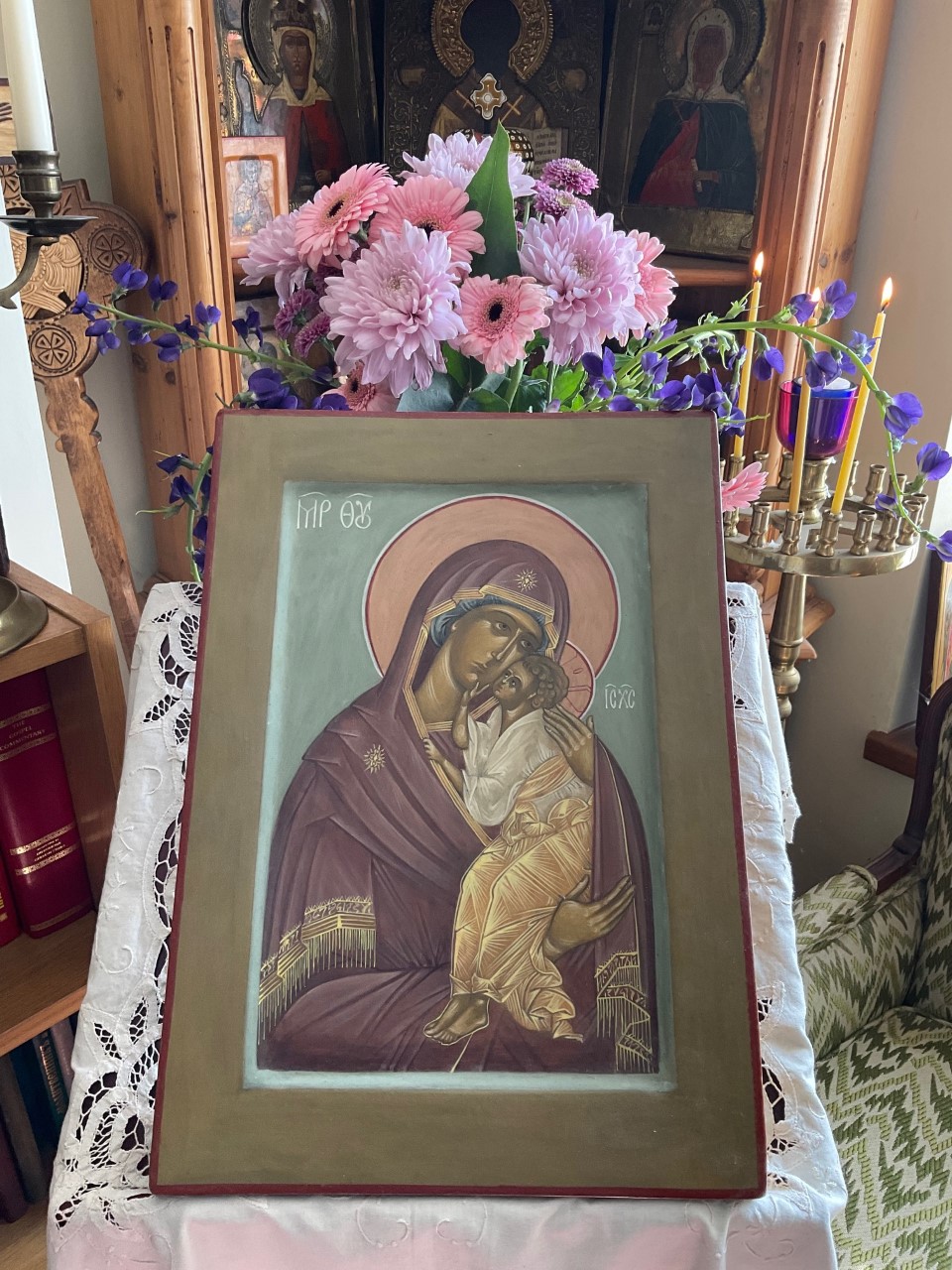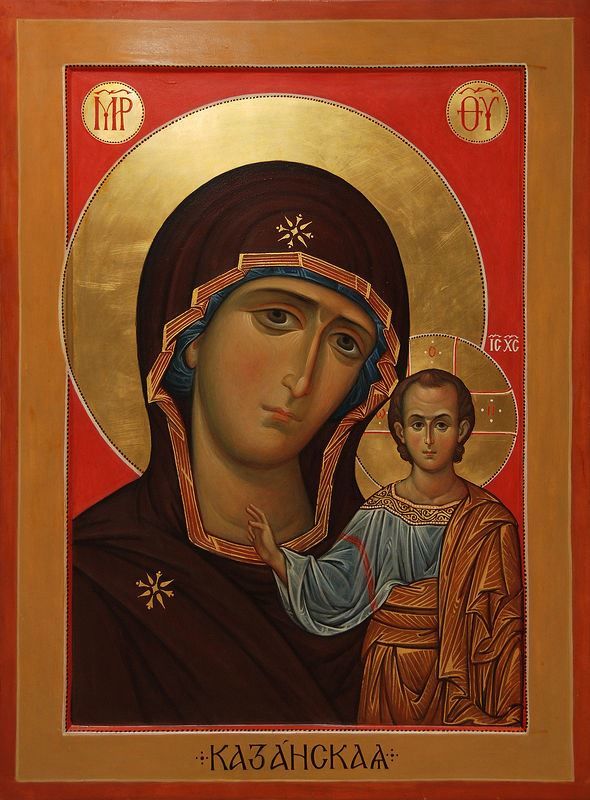A Supplicatory Canon to the Most Holy Theotokos
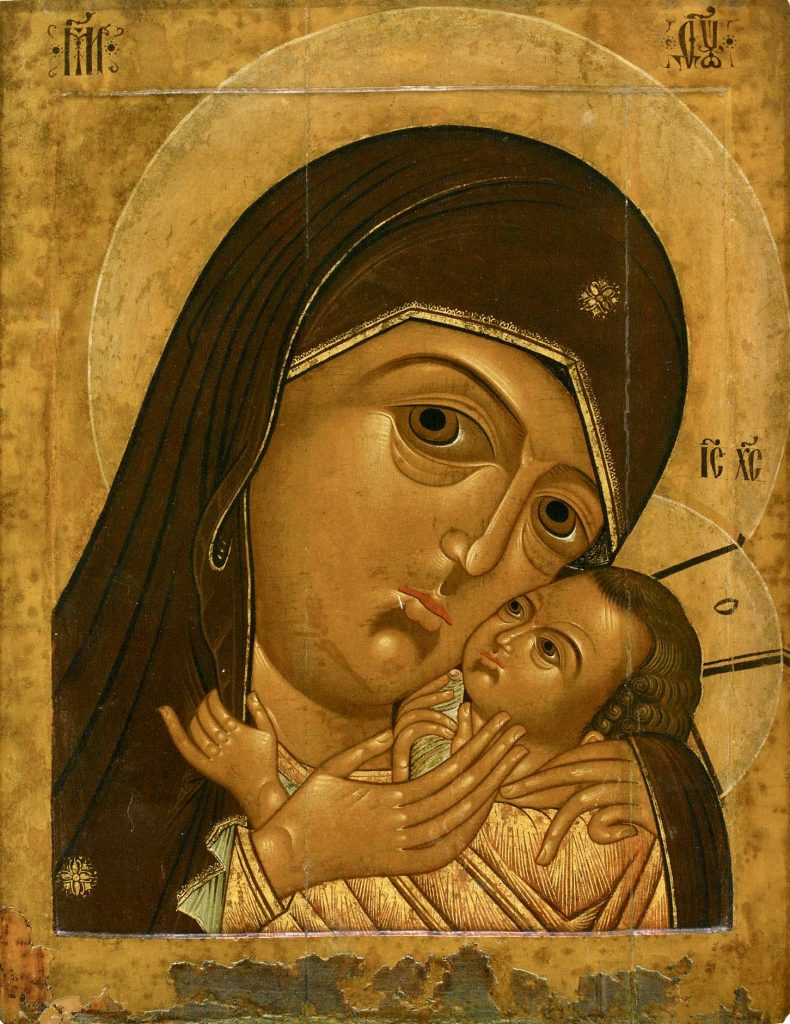 Ode I, Irmos: Let us all chant a triumphant hymn unto God * Who wrought wondrous miracles * with His upraised arm, * and saved Israel, * for He hath been glorified.
Ode I, Irmos: Let us all chant a triumphant hymn unto God * Who wrought wondrous miracles * with His upraised arm, * and saved Israel, * for He hath been glorified.
Most Holy Theotokos, save us.
Rejoice, О most pure sanctuary, О Virgin, adornment of the angels and receptacle of the Spirit, О immaculate Bride of the Unoriginate Father and Mother of God the Word!
Most Holy Theotokos, save us.
Thou art a Queen, in that thou art the daughter of the King, О Lady Theotokos, having produced and given birth to God the King in the flesh; and thou reignest with Him.
Glory be to the Father, and to the Son, and to the Holy Spirit.
From the manifold misfortunes of my whole life do thou deliver me, О intercessor, that I may raise my voice in thanksgiving to thee: О pure Theotokos, rescue me from the torment which is to come!
Now & ever, and unto the ages of ages. Amen.
The Church proclaimeth thy birthgiving with Orthodox doctrines and divine hymnody, О Virgin Bride of God, for it venerateth the signs of the incarnation of thy Son.
Ode III, Irmos: The stone which the builders have rejected, * the same hath become the cornerstone: * this is the rock upon which Christ hath established the Church, * which He hath redeemed from among the nations.
Most Holy Theotokos, save us.
As thou hast the glory of virginity, thou hast been invested with the grace of the Holy Spirit, О most pure Mary, who hast been shown to be the Theotokos. О new and hidden mystery! For how dost thou remain a virgin, having given birth to God in the flesh?
Most Holy Theotokos, save us.
Who can recount what Thou hast done, О Lord? For Thou hast shown Thyself to be the Son of one who should have been cursed to give birth to children amid grief. Yea, the fallen nature of women rejoiceth in Thee our God, because of the Theotokos.
Glory be to the Father, and to the Son, and to the Holy Spirit.
Through thee, О most pure Mary, who alone art the Theotokos, hath the world been freed from the tempest of transgressions. Wherefore, having thee as a haven of salvation, we the faithful praise thy mighty works with hymnody.
Now & ever, and unto the ages of ages. Amen.
The prophets of old hymned thy virginity, saying that thou wouldst give birth within time to the Timeless One, to the Word Who is beyond words, Christ our God, One of the Trinity. Him doth the Church honour with images, О pure Mary.
Ode IV, Irmos: Foreseeing in the Spirit O Prophet Habbakuk, * the incarnation of the Word, * thou didst proclaim, crying aloud: * When the years draw nigh, Thou shalt be known; * when the season cometh, Thou shalt be shown forth! * Glory to Thy power, O Lord!
Most Holy Theotokos, save us.
In many ways the mirror of the divine prophets, sevenfold in radiance, hymneth thy prefigurations; and we, receiving the signs of thy departure in deed, believe thee to be the true Theotokos, beholding thee in matter.
Most Holy Theotokos, save us.
Honouring thee as the true Mother of God as is meet, О pure Virgin, we offer our own cry to thee, who wast proclaimed in the law and the prophets: Rejoice, О joyous one! The Lord is with thee!
Glory be to the Father, and to the Son, and to the Holy Spirit.
Behold! the Theotokos, the divine mountain, which Habbakuk saw manifestly overshadowed with the virtues, hath shone forth in the world. And through her we who of old fell away through disobedience have straightway drawn nigh again to God.
Now & ever, and unto the ages of ages. Amen.
Blessed is the tongue which hath been deemed worthy to honour thy birthgiving with Orthodox faith and doctrine and works, О most pure and pure one, truly showing forth all the images of the incarnation of thy Son.
Ode V, Irmos: Seeking Thee early in the morn, * we sing Thy praises, O Christ God, * who for our sake became poor * and in Thy flesh * endured the Cross and death.
Most Holy Theotokos, save us.
In a secret and hidden manner Moses revealed thee as the bush which burned without being consumed, О Lady Theotokos; for thy material womb was not consumed by the Godhead.
Most Holy Theotokos, save us.
Thou art my strength, thou art my boast and joy! Thou art my preserver, my help, refuge and mine invincible intercessor, О most holy Virgin Theotokos. Wherefore, save thou thy servant!
Glory be to the Father, and to the Son, and to the Holy Spirit.
Turn not away from the praise of our defiled lips, О most pure Theotokos; for there is no one on earth who dare hymn thee as is meet.
Now & ever, and unto the ages of ages. Amen.
He Who was born from the Virgin is One Being in two natures: Invisible God and visible Man, Who for our sake assumed the likeness of men.
Ode VI, Irmos: Emulating the Prophet Jonah, I cry aloud: * Free Thou my life from corruption, O Good One; * and save me who crieth out: * O Saviour of the world, Glory be to Thee!
Most Holy Theotokos, save us.
The seven-branched candlestand of the prophets perceived thee to be the noetic lamp-stand, О Virgin, manifestly showing forth the activity of the Spirit Who shineth forth within thee.
Most Holy Theotokos, save us.
О Virgin, thou wast, truly shown to be the tree of Life which hath slain the deceiving serpent with thy fruit, having given birth to Christ God, our Life.
Glory be to the Father, and to the Son, and to the Holy Spirit.
Beauteous praises should not be offered to thee from defiled lips, О pure Mother of our God; rather, behold thou the desire of my soul, and accept it.
Now & ever, and unto the ages of ages. Amen.
The iniquitous rage in tumult of bitter unbelief when they behold the assemblies of the Orthodox venerating thine image, О Virgin.
Lord, have mercy. Lord, have mercy. Lord, have mercy.
Glory be to the Father, and to the Son, and to the Holy Spirit; now & ever, and unto the ages of ages. Amen.
Sessional hymn, Tone I: Guide thou my wretched life, О pure one, and take pity on my soul, which hath stumbled into the abyss of perdition through many transgressions, О all-immaculate one; and at the hour of my death free me from the accusing demons and from the terrible sentence.
Ode VII, Irmos: Thy children who were in the furnace O Saviour, * were neither touched nor troubled by The fire. * Whereupon the three sang, as with a single mouth * Thy praises and blessed Thee, saying: * ‘O God of our fathers, Blessed art Thou.’
Most Holy Theotokos, save us.
Thou hast been revealed to be all-adorned with the virtues, with glory and the honour of virginity, О Bride of God; for thy comeliness is truly most beautiful in magnificence, and the Lord Who loveth thee hath brought Thee, His divine Mother, to Himself.
Most Holy Theotokos, save us.
Thou hast manifestly become a staff of uprightness, a most precious staff of royalty; wherefore, thou didst bring forth as fruit, the Word of God, which the miracle of Aaron’s rod clearly prefigured of old.
Glory be to the Father, and to the Son, and to the Holy Spirit.
Having defiled my body, mind and soul with many carnal passions, О pure one, how can I hymn the beauty of thy virtues? I am at a loss and am afraid. Yet be thou thyself my helper through thy supplications.
Now & ever, and unto the ages of ages. Amen.
I honour the union of Thine incarnation, О Christ, and I reverently venerate the image thereof, for, though Thou art the pre-eternal God, yet didst Thou become an immutable man, being perfect in both natures.
Ode VIII, Irmos: Him of whom the angels and all the hosts of heaven are in awe * as their Lord and Creator, * ye priests hymn, ye children praise, * ye peoples bless and supremely exalt * throughout all ages.
Most Holy Theotokos, save us.
Let the divine sanctity of God be hymned, whereby the world hath been delivered from corruption! Let all who have fallen then rise up, for Mary hath given birth to Christ, our salvation!
Most Holy Theotokos, save us.
We hymn thee, О most pure Mother of God. Who will not glorify thee, who art truly good, the hope of our souls? Wherefore, О most holy one, accept thou our cries.
Glory be to the Father, and to the Son, and to the Holy Spirit.
Adorn yourselves today with hymns, О ye faithful! Ye angels and men, give glory together; for the devil and despair are fallen! Mary hath for us given birth to our hope of salvation!
Now & ever, and unto the ages of ages. Amen.
О ye who are blind, describe not the Godhead, and tell no falsehoods! For He is simply invisible and unseeable. Yet, depicting the image of the flesh, I venerate it, and with faith I glorify the Virgin who gave birth to the Lord.
Ode IX, Irmos: The light-bearing cloud upon whom * the Unoriginate Master of all descended from heaven, * like the dew upon the fleece, * and of whom He was incarnate, * becoming a man for our sake, * let us all magnify as the pure Mother of God.
Most Holy Theotokos, save us.
Rejoice, О Mary, thou great wonder of all creation! Rejoice, О daughter of David and Mother of the Lord! Rejoice, subject of Gabriel’s hymnody! Rejoice, О pure one, thou refuge, confirmation and help of all sinners on earth!
Most Holy Theotokos, save us.
The wondrous Joachim and the godly Anna, beholding on earth Mary, the Mother of the Creator, to whom they gave birth as a daughter, hymn her through the divine Spirit and chant songs of thanksgiving. By her supplications save us all, in that Thou art God.
Glory be to the Father, and to the Son, and to the Holy Spirit.
О most holy Virgin Mother of God Most High, thy birthgiving on earth hath been shown to be the salvation of sinners and the lowly; for in thee have we been saved who have faith. Yet save me also, now and throughout all the living ages.
Now & ever, and unto the ages of ages. Amen.
I know the Word to be incarnate, yet immutable. Wherefore, I hymn Thee with faith, Who art in two natures but one hypostasis. And proclaiming Thee to be truly God and man, I end my hymnody.
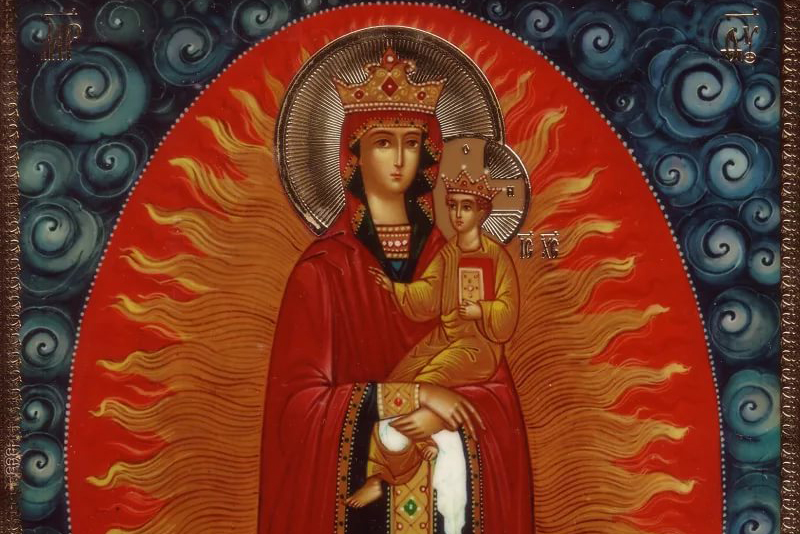
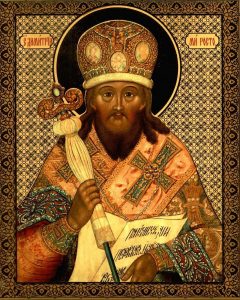
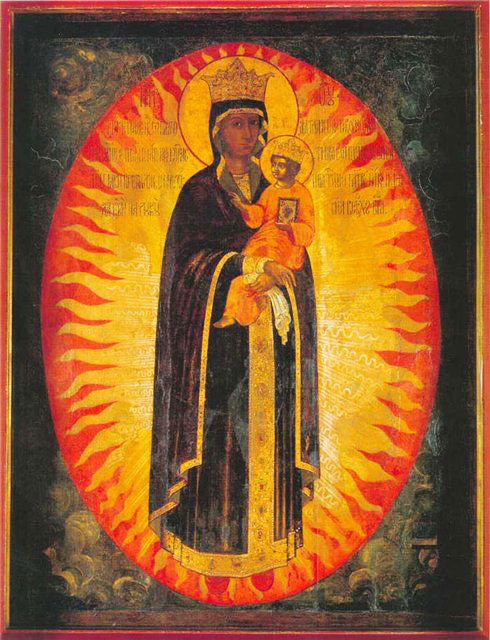
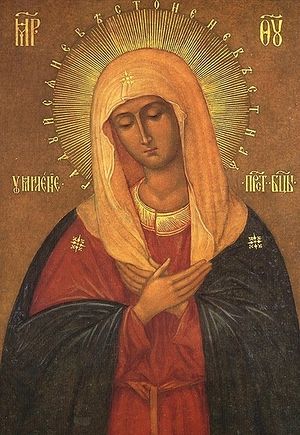 He looked on her humility and her gentleness and her purity, and dwelt in her because it is easy for Him to dwell within the humble.
He looked on her humility and her gentleness and her purity, and dwelt in her because it is easy for Him to dwell within the humble.